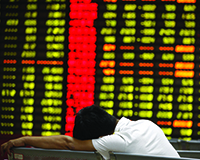How should the market prepare for another economic downturn?
When Andrew Roberts, Royal Bank of Scotland’s head of European economics, rates and CEEMEA research, last week said the economic sky was about to fall on our heads, he publicly expressed what some had been whispering ever since the Chinese stock market slide last June.
A further week of falling markets and similar comments by Albert Edwards, a strategist at Société Générale, has not made the mood any more upbeat.
So if these economists are correct, then how should the property market prepare and what would be the impact of another downturn?
Russell Chaplin, chief investment officer for property at Aberdeen Asset Management, says investors should aim to create high-quality portfolios with stable income and minimal risk in anticipation of any downturn.
When Andrew Roberts, Royal Bank of Scotland’s head of European economics, rates and CEEMEA research, last week said the economic sky was about to fall on our heads, he publicly expressed what some had been whispering ever since the Chinese stock market slide last June.
A further week of falling markets and similar comments by Albert Edwards, a strategist at Société Générale, has not made the mood any more upbeat.
So if these economists are correct, then how should the property market prepare and what would be the impact of another downturn?
Russell Chaplin, chief investment officer for property at Aberdeen Asset Management, says investors should aim to create high-quality portfolios with stable income and minimal risk in anticipation of any downturn.
He says high-quality assets could recover strongly following any collapse as investors chase properties that generate reliable revenue. Finding such assets, or creating them through asset management, is intensive and difficult in any market, and usually comes at a price. “Should people be selling out of property [following a collapse]? No, I don’t think so,” he says, anticipating a bounce following any panic.
“You need to have your leases secured, your vacancy minimised and your debt levels positioned relatively low,” but doing that in a falling market, he says, is “very difficult,” adding: “Once you go into steep decline, you end up relying on things that you can’t necessarily control.”
If a correction happens, there is likely to be, as in 2008 and the years following, a rush of investors seeking early redemptions from funds over a six-month period, which would subsequently force a sell off.
“Six months is not a very long period of time, so you would be looking at moving on your more liquid assets because you need the capital to allocate back to investors,” says Simon Durkin head of UK research at BNP Paribas Real Estate.
Having tradeable assets in liquid markets that investors can sell quickly will be crucial, and investing now is increasingly becoming about preserving value rather than soaring markets.
“That is where RBS got it right – it’s all about return of capital, rather than capital appreciation,” says Durkin.
Any downturn may not be as severe this time around, however, as there are more cash-rich buyers and sovereign wealth funds involved in the sector. This could essentially set a floor to pricing in the market.
“I think a downturn, a change in the cycle, is probably a better way of saying it than a crash,” says Durkin.
While some may suffer from a sell-off, cash-rich sovereign wealth funds are likely to use profits from the boom to fuel a further diversification of their assets into real estate. Any slowdown would give them an opportunity to invest more in what are generally presently perceived to be overheated, prime and illiquid markets.
The Investment Intentions Survey 2016 from Inrev, published last week, saw target allocations from global funds rise by nearly one percentage point to 10.3% of all investment by the end of 2016, and this could rise further if pricing overall within the sector eases off.
The view that any slowdown in the broader economy would have minimal impact on property is shared by Robin Martin, head of research and strategy at Legal & General Property.
“I am a little bit cautious about just interpreting global markets’ volatility as negative for our asset class. It really does depend on the detail,” he says.
Martin believes the economic apocalypse predicted by RBS will result in continued low interest rates and a flight to safe havens such as London.
“What you tend to see is that when people become more concerned, they become more concerned about income security and with liquidity,” says Martin. With London and other European capitals potentially providing both, they could even see more capital flood in.
So while there may be a dip in real estate values if RBS is correct, the effect on the market is not anticipated to be nearly as bad as it will be for the stock markets or even for bonds.











